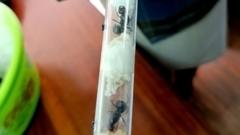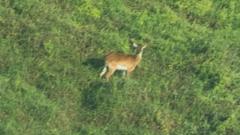In a landmark case against wildlife trafficking, four men were caught in Kenya attempting to smuggle hundreds of prized ants, valued at up to £170 each, destined for the international pet market. The case underscores a shift in trafficking from traditional species to lesser-known insects crucial to ecological balance.
Kenyan Authorities Capture Ant Smugglers in Unprecedented Wildlife Case

Kenyan Authorities Capture Ant Smugglers in Unprecedented Wildlife Case
Four suspects face prosecution for attempting to illegally export rare ants, highlighting a growing trend in exotic wildlife trafficking.
In a remarkable enforcement action, the Kenya Wildlife Service (KWS) has successfully apprehended four individuals who attempted to smuggle hundreds of rare ants out of Kenya. This case marks a pivotal moment in wildlife protection efforts, as KWS typically focuses on larger animals like lions and elephants, but is now stepping up measures to protect lesser-known species vital to ecological balance.
The suspects, who include two Belgians, a Vietnamese, and a Kenyan, have pleaded guilty to charges stemming from their sophisticated smuggling operation. The insects, primarily giant African harvester ants, were found concealed in modified test tubes filled with cotton wool. This method was engineered to ensure the ants could survive for extended periods during transport, revealing a calculated strategy to circumvent security measures and disguise the contents of the containers.
KWS spokesperson Paul Udoto highlighted the unprecedented scale of this “bio-piracy” case, explaining that the exact number of ants is still being assessed. The primary destination for these ants appears to be the lucrative exotic pet markets in Europe and Asia, where collectors seek to observe them in specialized habitats called formicariums. The giant African harvester ant, known for its impressive size—up to 20mm for workers and 25mm for queens—has gained popularity among insect enthusiasts.
Pat Stanchev, the general manager of an insect-dealing website based in the UK, acknowledged the allure of these massive ants, although he does not sell them himself. He noted that illegal imports of exotic insects are a known issue within the trade.
KWS has emphasized that the smuggling of such species is constrained by international biodiversity treaties, and they are firm in enforcing compliance with these regulations. This case has been framed as a transformative step in Kenya's fight against unconventional wildlife crimes, sending a strong message to potential traffickers.
The four suspects are scheduled for sentencing soon, as Kenyan authorities continue to adapt their strategies in the fight against wildlife trafficking, shifting focus to the protection of even the most unexpected species.




















